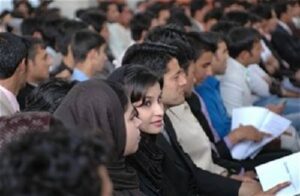
KABUL (SW): Mohammad; Bachelor of Literature: I was a student at the Faculty of Literature of Kabul University. The last year I had to work on my dissertation. I gathered a lot of information and talked to other students as well about writing the final thesis.
But my real problem was the lessons for research method – dissertation writing course. The time for the course was spent on telling jokes and funny stories of teachers and students. That was the reason I did not learn anything from this very important course. Towards the end of the semester, I was very concerned about my research. I knew that I did not know anything about the research method.
After months of wandering and worrying, I finally gave my dissertation to my supervising professor to receive feedbacks; and that for the title, or irrelevant things such as PhD title of the professor, etc.
My supervising professor looked at the dissertation briefly and said: “take your dissertation for printing to the printing shops and get three or four copies of it”.
I followed my supervisor’s advice, but when I went to the dean’s office, the professor crossed the words such as Danishgah (Farsi word for University), Danishkadah (Farsi word for Faculty or School or Department) and Guruh (Farsi word for batch or class). He said, instead of these write Pohenton (Pashto word for University), Pohenzai (Pashto word for Faculty or Department or School) and department. I followed the order easily again, and this time my thesis was accepted.
All that pain, all that sleepiness and staying awake all nights, and the anxiety and apprehension; I still don’t know what its result was! The supervisor did not guide me in any way. The content and the purpose of the dissertation did not matter to him. Even once he did not read the thesis from start to end.
The only thing he did was to object the three words. If the professors take the thesis of students seriously and teach the research methods correctly and with standards, no student will face any problem in his/her work or in continuing their education.
But regrettably that it’s not the case. Neither the research is done in its real sense and nor any one read the dissertations. That’s why Afghanistan has no share in the creation of knowledge.

Hassan Razayee, professor at a university said “there is little difference in the dissertation writing in different level of education; but in general it is standard scientific knowledge or trend. In the bachelor level the strictness is usually less, the dissertation is mostly for knowing how to write the thesis and conduct research.
Initially, the School (Faculty), assigns a supervisor for the student. The subject which has been proposed previously by the student; after it is approved will be researched under the supervision of the Faculty Professor. The student is required to consider all the views and opinions of the professor in the thesis.
When the thesis is completed, it will be available to the supervising professor. The supervisor must read the thesis and after a while he/she must meet the student and provide the student with corrective comments if any. After the thesis is approved, the supervisor gives the student a grade.
Unfortunately, two things are not paid attention to in the universities in Afghanistan. One is a scientific writing method; means how students should write. The second point is the research method; means how students should study, how they should collect information and do research, how should they sort the information, and how to prepare them into thesis and draw conclusions.
The weakness is on both sides. It is also a weakness in professors who are not familiar with modern and scientific methods of research currently prevailing in the world, as well as weakness in the students who are trying to getting over with their dissertation without thorough research.
ENDS





